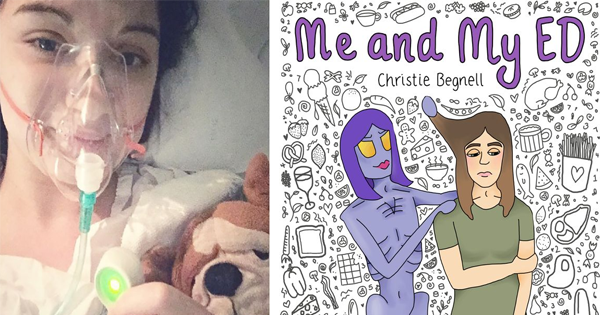Advertisement
When Christie Begnell was 19 years old, she went through a terrible break up that prompted her that ended up bringing up a bout of depression. She had suicidal thoughts and turned to food as a way to cope with her stress.
“When my boyfriend of two years and I broke up,” she explained, “things spiraled really quickly. For a few days, I did the stereotypical thing of eating ice cream and crying.”
Rather than allow her to feel better though, the next time Begnell really looked at herself in the mirror, she could only notice the “few kilos” she’d gained from eating all the ice cream she had. “This voice appeared in my head, telling me I was disgusting,” she said.
That was when the voice in her head began to chime in. Begnell called the voice “Anna.”
Anna would constantly offer opinions throughout the day, telling Begnell to not eat. “It was impossible to ignore,” Begnell confessed.
Soon enough, Begnell had downloaded a calorie counting app to monitor exactly what she was putting into her body. At first, she started out small, simply reducing her daily calorie intake to about 1,200 calories per day.
“But as I saw the changes in my body and I became skinnier, it was strangely addictive,” she explained. “Especially when ‘Anna’ would tell me what a great job I was doing.
“Looking back now, it’s actually pretty scary how quickly it all happened.”
Within three months of Begnell’s diet plan, she’d reduced her calorie intake to barely 300 calories a day. Her tactic of staying full with such little food in her body? Carbonated drinks.
Looking back, Begnell knows how dangerous her behavior was. But at the time, she had no idea how to conquer it and change her lifestyle to comething more normal and sustainable.
“I had no self-identity. It was all controlled by ‘Anna.’ She would make these promises to me, and they were things I desperately wanted.
“If I lost another kilo, I’d have more friends and would be more liked,” Begnell had reasoned to herself. “Every day that I survived on just a few liquid drinks, was a good day to me.”
Thankfully, during that time, Begnell had been seeing a psychiatrist for her mental health condition, who very quickly spotted that Begnell’s weight was dropping at a dramatic rate.
Within three months, Begnell dropped just over 26 pounds. Although she stood over 5’6”, Begnell at her lowest weighed just 116 pounds, and her BMI barely reached 17.
Begnell’s psychiatrist sent her to several different eating disorder clinics in hopes of helping Begnell’s health improve. But even as Begnell managed to bring her weight back up to a sustainable number, she knew her mental problems weren’t disappearing as quickly.
“That’s when I started drawing, showing exactly the thoughts of guilt, hate and fear that were going on in my mind,” she explained. “Now, I’m even bigger than I was before I got sick. …’Anna’ is still in my head. She always will be.
“That’s why my drawings have helped so much. It can be really hard to verbalize what’s going on and the illustrations have helped explain it.”
To this day, Begnell still confesses that she struggles with her eating disorder, but now she knows to use drawing as a way to keep her thoughts and mind in the present, and not get warped with the desire to overthrow her diet again.

Many of her drawings have since been collected in a book together and sold for other people to find comfort and understand what people living with anorexia endure every day.
“I want these sufferers to know, they’re not alone,” Begnell said.




